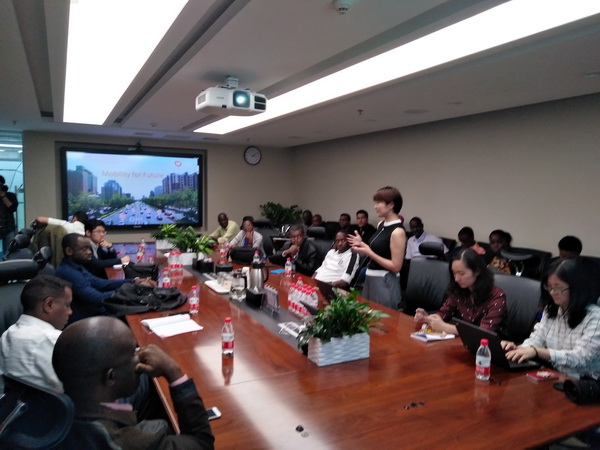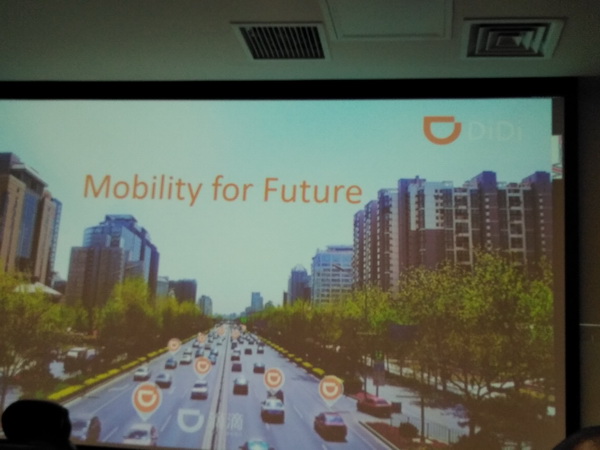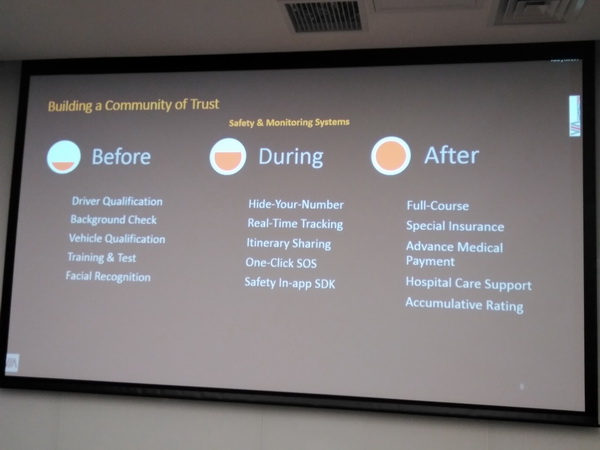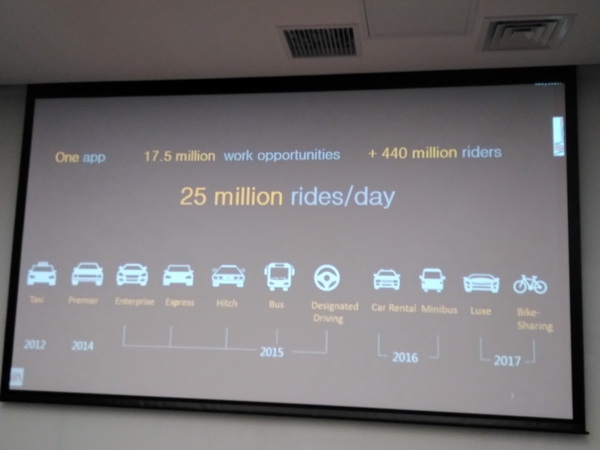


With a population of almost 1.4 billion, transporting millions of commuters every day is no small task for China’s public transport system. And so a group of 42 African, South Asian and Southeast Asian journalists recently visited DiDi Chuxing, a firm that runs a shared transport platform in the Chinese capital, Beijing, to find out how it helps in facilitating mass transit across the country.
Taking the journalists around, Aaron Liu, one of DiDi’s Public Relations Managers, said the platform was set up in 2012 because the transport situation in major cities was getting worse as demand outstripped supply. The shared public transport platform began with taxis before expanding to other modes of transport.
400 Chinese cities covered
The application enables subscribers to use cost-effective means of transport in 400 Chinese cities, with 450 million registered passengers and 19 million drivers, Sun Liang, DiDi Senior Communications Director explained. On average, 25 million rides are made each day as customers’ requests are responded to with the closest possible services. There are pickup points for passengers.

DiDi's services can be summarised by the belief that there is always a better journey. Photo by Kimeng Hilton
The output of drivers is tracked through Global Positioning Systems (GPS) installed in subscribers’ phones; and also feedback from passengers, explained Sun Liang. This way, hard working and well behaved drivers are rewarded with better pay, Sun Liang told the visiting journalists. According to her, DiDi’s services can be summarized in the catch phrase, “There is always a better journey.”
17.50 million jobs created
As many as 17.50 million job opportunities have been created in 400 cities across China since DiDi came into existence five years ago. The platform helps in transporting more than 440 million passengers. The platform employs 7,000 workers, 50 per cent being engineers and data scientists and half of them being female. Because of the pressure of work, engineers are obliged to exercise at work for 10 to 15 minutes on Wednesdays.
DiDi’s goal is to become a global leader in smart transportation and automotive technology, the world’s largest operator of vehicle networks and a global leader in smart transportation systems by 2020. “We are committed to work with communities and partners to solve the world’s transportation, environmental and employment challenges by using big data-driven deep learning algorithms that optimize resource allocation,” explained Sun Liang.

DiDi's shared ride platform covers 400 Chinese cities. Photo by Kimeng Hilton
“By continuously improving users’ experiences and creating social value, we strive to build an open, efficient, collaborative, and sustainable transportation ecosystem,” Sun Liang underscored. After six months of operations, DiDi had only 1,000 rides a day at the end of 2012. Today, it boasts 25 million daily rides. The company’s partners have a fleet of 250,000 electric vehicles.
Foreign outreach
DiDi began extending its activities abroad in 2015. Management believes that there are prospects in the developing world where car ownership is still low. DiDi merged with Uber China in 2015, Kuaidi in 2014 and has partnerships with Ola in India, Taxify in South Africa, Careem in the Middle East and North America, 99 in Brazil, Lyft in the US and Grab in Southeast Asia. DiDi now has 9 different businesses. Meanwhile, Careem is currently testing the shared transport application in Egypt and South Africa.

Security safeguards to protect passengers. Photo by Kimeng Hilton
DiDi Chuxing offers a diverse range of transportation services through one mobile application. It uses an intelligent ride-matching system that ensures multi-person car-pooling within and across cities, real-time traffic mapping and route optimization. Cities are supported by DiDi to efficiently and sustainably plan transportation using big data-based transportation capacity.
Security safeguards
DiDi Express is the most cost effective service costing at least 13 RMB a ride. Normal taxis in Beijing charge from 15 RMB per ride. The security measures taken by DiDi include verifying that drivers are actually who they claim to be, checks are carried out on drivers’ backgrounds and their papers are thoroughly scrutinized in conjunction with law enforcement and local transport authorities, officials stressed. Subscribers’ and drivers’ phone numbers are concealed in order to protect them.
"There is an emergency button on the application installed in subscribers’ phones. There is also round-the-clock service throughout the week," Sun Liang assured, adding that the application is able to track down the location of drivers and passengers at any time. Moreover, a comprehensive insurance package is offered to drivers and passengers in the event of accident.

From 12,000 rides a day in 2012, DiDi 's platform today makes an average of 25 million daily rides. Photo by Kimeng Hilton
Averting gridlocks
DiDi makes use of Big Data and Artificial Intelligence to warn drivers and customers of areas of traffic congestion. In order to make better use of time, the application enables subscribers to go to designated pick-up points just when vehicles are about to arrive.
*Kimeng Hilton Ndukong, a contributor to People’s Daily Online, is Sub-Editor for World News with Cameroon Tribune bilingual daily newspaper in Cameroon. He is currently a 2017 China-Africa Press Centre, CAPC fellow.
 Fire brigade in Shanghai holds group wedding
Fire brigade in Shanghai holds group wedding Tourists enjoy ice sculptures in Datan Town, north China
Tourists enjoy ice sculptures in Datan Town, north China Sunset scenery of Dayan Pagoda in Xi'an
Sunset scenery of Dayan Pagoda in Xi'an Tourists have fun at scenic spot in Nanlong Town, NW China
Tourists have fun at scenic spot in Nanlong Town, NW China Harbin attracts tourists by making best use of ice in winter
Harbin attracts tourists by making best use of ice in winter In pics: FIS Alpine Ski Women's World Cup Slalom
In pics: FIS Alpine Ski Women's World Cup Slalom Black-necked cranes rest at reservoir in Lhunzhub County, Lhasa
Black-necked cranes rest at reservoir in Lhunzhub County, Lhasa China's FAST telescope will be available to foreign scientists in April
China's FAST telescope will be available to foreign scientists in April "She power" plays indispensable role in poverty alleviation
"She power" plays indispensable role in poverty alleviation Top 10 world news events of People's Daily in 2020
Top 10 world news events of People's Daily in 2020 Top 10 China news events of People's Daily in 2020
Top 10 China news events of People's Daily in 2020 Top 10 media buzzwords of 2020
Top 10 media buzzwords of 2020 Year-ender:10 major tourism stories of 2020
Year-ender:10 major tourism stories of 2020 No interference in Venezuelan issues
No interference in Venezuelan issues
 Biz prepares for trade spat
Biz prepares for trade spat
 Broadcasting Continent
Broadcasting Continent Australia wins Chinese CEOs as US loses
Australia wins Chinese CEOs as US loses